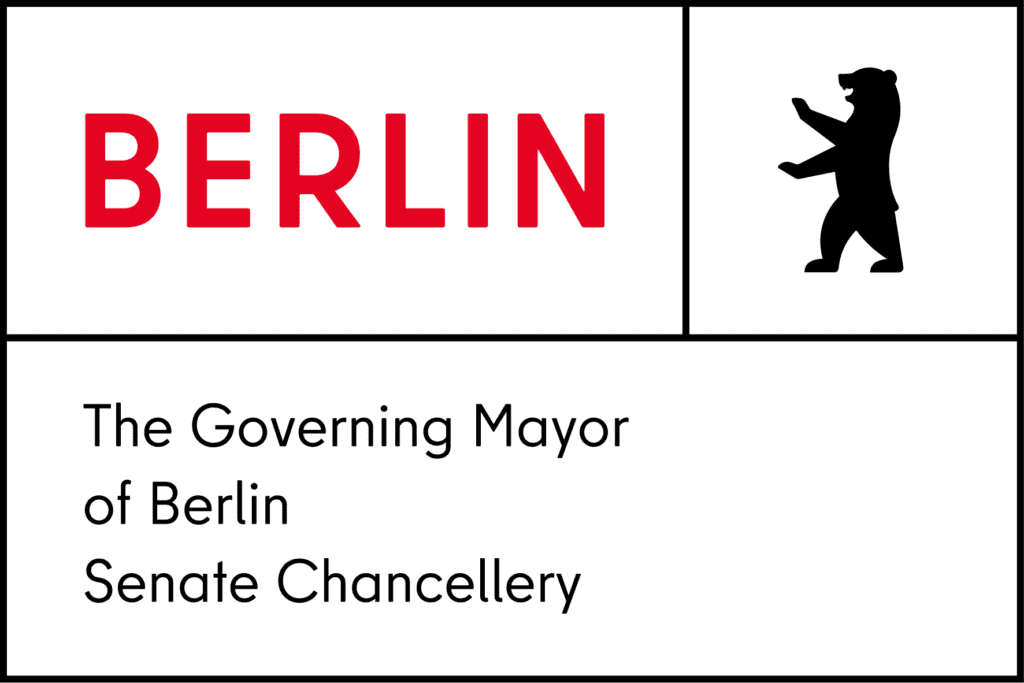On June 30, 2022 we celebrated our third anniversary – and we did so in style! It was the first in-person summer party since we opened in 2019, and you showed us once again that we have the best community and work for the greatest city in the world!
The Summer Party in numbers:
🥳 650 guests
📢 32 sessions
🔥15 hours of program
🎤45 speakers
🎶 3 artists
Here’s a review of a day packed full of highlights:
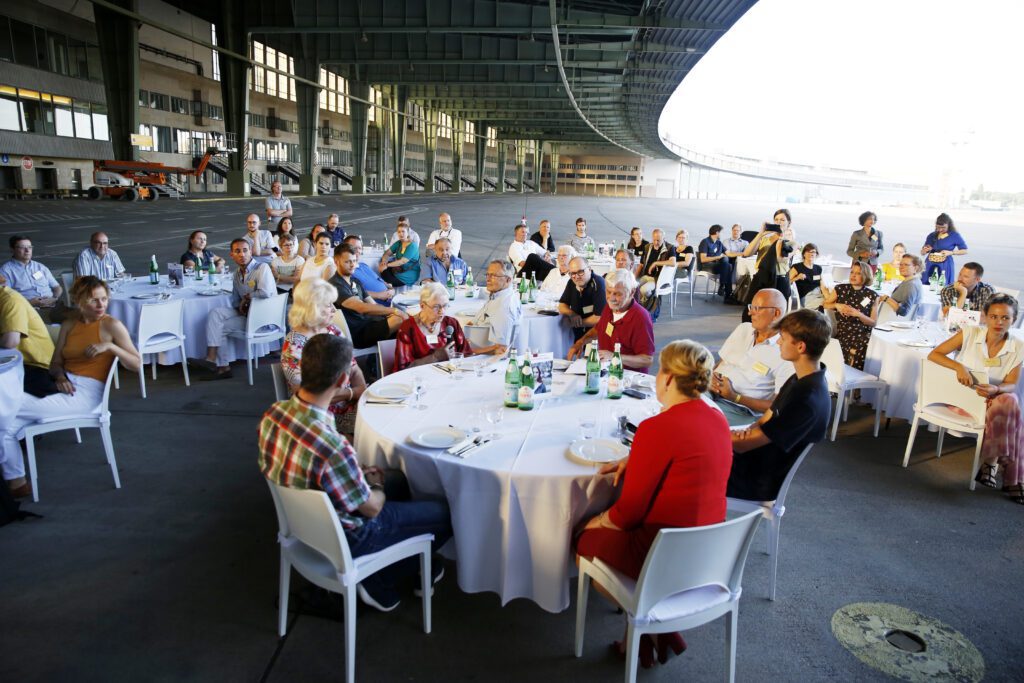
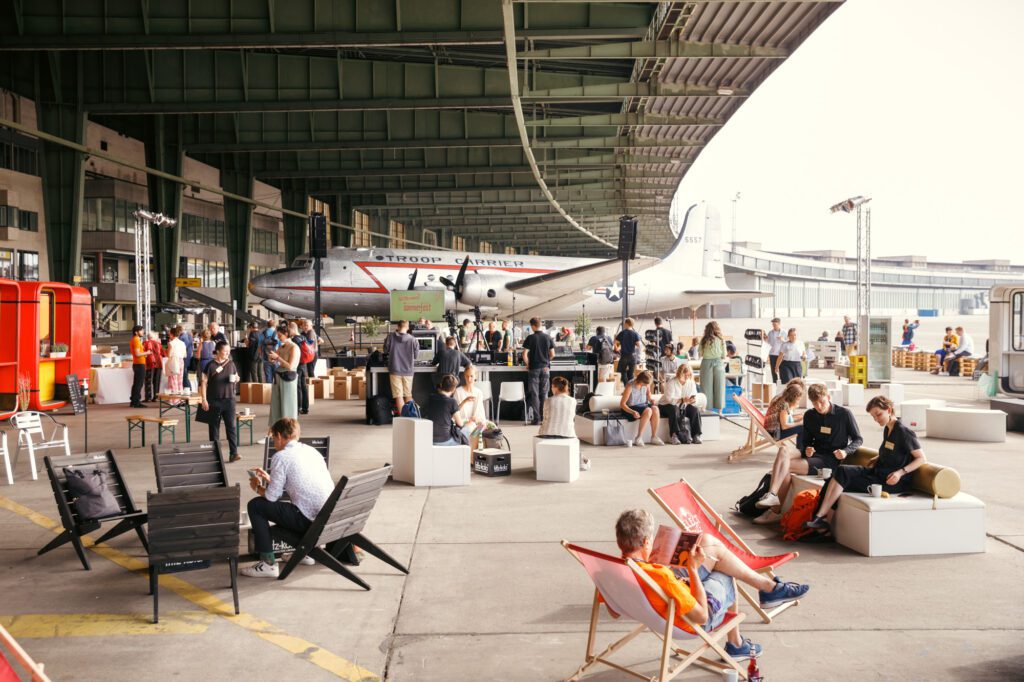
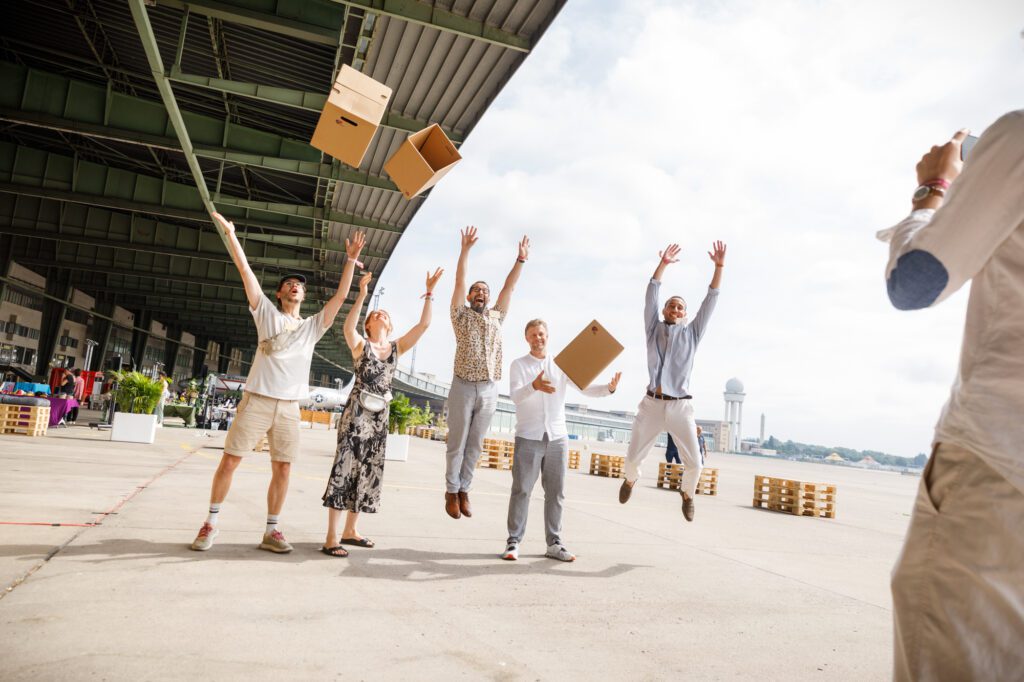
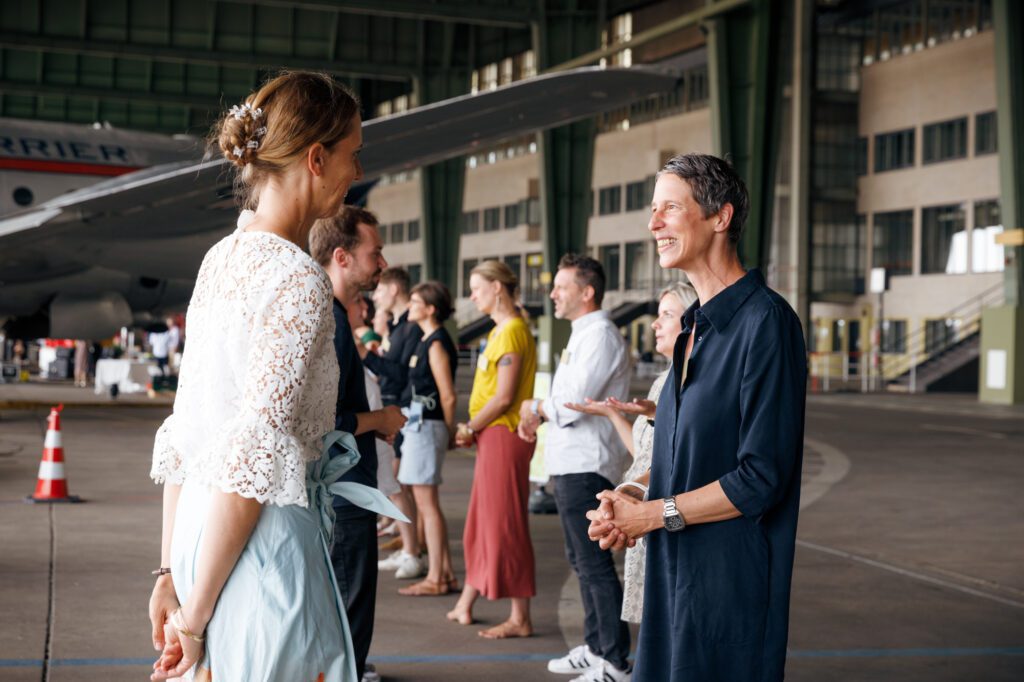
You can watch all the talks on YouTube, too:
Smart city developments in Germany – public benefit-oriented concepts rather than a focus on technology.
Smart city developments have taken a fundamental turn in the last decade. The smart city concept of a technology-centered city in which citizens are simply the subject of data measurement is hardly ever applied any more in Germany. Instead, today’s smart cities are geared to holistic urban development concepts that combine digitalization and urban development and put residents at the center of interest. These developments have received momentum in Germany from the publication of the Smart City Charter and the Smart Cities model projects funding program. But how can we ensure that smart cities offer genuine quality of life? How can they foster innovation and help shape urban development and digitalization to meet people’s needs? How can they draw on technology and digitalization to support the design of sustainable cities that are geared towards public benefit?
With:
· Karen Laßmann, Senate Chancellery Berlin, Head of the Smart City Unit
· Adriana Groh, The New Institute, Project Management
· Dr. Benjamin Seibel, CityLAB Berlin / Technologiestiftung Berlin, Head of CityLAB Berlin
· Dr. Hilke Berger, CityScienceLab @ HafenCity University Hamburg, Scientific Lead
· Moderator: Matthias Punz, Tagesspiegel Background Smart City & Administration, Editorial Director
OZG – ohjemine? How can we make the digital transformation of the administration a success?
Implementation of the Online Access Act raised hopes throughout Germany that administrative services would be digitalized by the end of 2022 so as to make citizen services more accessible. Now that we are half way through the year, the assessment is mixed: although some progress has been made, we’re still a long way from achieving the goal of making all administrative services available to citizens. How can we still make the digital transformation of the administration a success? What hurdles stand in the way? How do we digitalize citizen services so that they are geared towards the needs of citizens?
With:
· Prof. Dr. Sascha Friesike, Weizenbaum Institute, Berlin University of the Arts, Director Weizenbaum Institute and Director of Studies, Professor at UdK
· Jutta Lautenschlager, GOVMEN GmbH, Managing Director
· Dirk Meyer-Claassen, Senate Department for the Interior, Digitalization and Sports Berlin, Head of Department
· Moderator: Caroline Paulick-Thiel, Politics for Tomorrow, Director
The new AI – how we make AI social, creative and sustainable
Artificial intelligence is able to deliver more than just jump faster and higher. Far from optimization and efficiency improvements, there is a huge, in large parts untapped potential for inspiration, social participation, climate protection, music, urban change and much more. In his talk, Florian talks about connecting the distant points of and with AI, giving examples and sharing his experience in this transdisciplinary approach of exploring the “new New” in AI.
With:
· Florian Dohmann, Birds on Mars GmbH, Founder & Chief Creative
Shaping the city with basic income
Blanka Vay and Ela Kagel present the Circles project, which seeks to provide an unconditional basic income for everyone. The discussion focuses on participatory design of municipal tasks and services founded on a basic income. Using examples from other countries such as South Korea and Brazil, Ela and Blanka present scenarios that are also of interest for Berlin.
With:
· Blanka Vay, Circles UBI, CEO
· Ela Kagel, Circles Coop / SUPERMARKT Berlin, Chair
Redesigning administration by means of service design
Slowly but surely, the administration is embracing its role as a service provider to the public. This can be seen in the increasing number of service portals. However, the administration still focuses heavily on specialized procedures necessary for service delivery rather than understanding what is needed from a user perspective. Service design is about creating useful, usable, and effective services. It focuses on users and their needs. In the talk, Charlotte and Martin discuss what this means and what it looks like in practice.
With:
· Martin Jordan, the Federal Government’s DigitalService, Head of Design
· Charlotte Vorbeck, the Federal Government’s DigitalService, Senior UX/UI Designer
Creating social belonging from scratch
Ananta Pandey talks about structures of social belonging, from her experiences with Sidewalk Labs, Medley Foundation and immigration.
With:
· Ananta Pandey, Medley Foundation gGmbH, Cofounder
New work in public administration – anything goes, no strings attached?
The concept of “new work” is on everyone’s lips and is also reflected in the vocabulary of public administration. In the public perception, this often raises the question: can administration be agile? But what does this mean in practice, and does the administration necessarily have to take this on board in order to establish a reputation as an attractive employer? Is there still a way the public sector can keep pace with the challenges of the digital transformation without embracing new work – or is it in fact already in the midst of change?
With:
· Christin Schnaak, Senate Department for the Interior, Digitalization and Sports, EGovernment, Digitalization, GPM, Open Data
· Felix Weisbrich, Roads and Green Spaces Department, Friedrichshain-Kreuzberg, Head of Office
· Moderator: Isabell Eberlein, Velokonzept, Managing Director
How can we boost social and political imagination?
Geoff Mulgan talks about how the many crises around us – economic, health, ecological, political – coincide with a crisis of imagination, and shows how we can better imagine and shape our society and economy a generation from now.
With:
· Sir Prof. Geoff Mulgan, University College London, Professor
Tools for urban transformation – how can cities become measurably sustainable?
Worldwide, cities are responsible for around 70% of global CO2 emissions. At the same time, the people who live in them are heavily affected by the impact of the climate crisis, depending on cooling greenery, clean air and safe mobility. For this reason, a lot of municipalities are seeking to actively shape a transformation towards creating sustainable towns and cities. The cities of the future are to be climate-neutral and healthy, offering real quality of life. There are already lots of approaches to strategically managing and measuring this change. Examples that are being embraced by cities include the United Nations Sustainable Development Goals (SDGs), local sustainability and smart city strategies, as well the donut economics. How can cities actually become measurably sustainable? How can ideas that are still often theoretical support strategic management in practice?
With:
· Prof. Dr. Florian Koch, HTW Berlin, Professor of Real Estate Management, Smart Cities and Urban Development
· Katharina Schlüter, PD – Berater der öffentlichen Hand GmbH, Senior Manager
· Moderator: Anne Kruse, CityLAB Berlin / Technologiestiftung Berlin, Project Manager Smart Cities
11 years of the Open Data Portal Berlin – what now?
Politicians often plug the economic potential of open data. But do the current structures and data really enable this potential to be tapped into, or is the whole thing still wishful thinking? The added value of open data in Berlin from the perspective of civil society, research and business.
With:
· Prof. Sebastian Meier, Potsdam University of Applied Sciences, Chair of Knowledge Transfer Design
AI – a tool for climate protection?
Artificial intelligence and machine learning are powerful tools to combat climate change: they can help mitigate climate change by reducing greenhouse gas emissions in various applications. And they can help with climate change adaptation, even advancing climate science itself. But AI and ML are not panaceas: they can only ever be part of a solution.
This talk starts with a general overview of the possibilities of AI in the field of climate protection and presents the publicly funded project Quantified Trees by Birds on Mars and Technologiestiftung Berlin as an example. We show how we’re using machine learning to develop scalable AI tools for effective irrigation and maintenance of urban trees. Quantified Trees brings together citizens and government agencies as well as botany and AI experts to ensure that AI is used not just for its own sake, but to create sustainable solutions.
With:
· Marcus Voß, Birds on Mars GmbH, Intelligence Architect and AI Expert at Birds on Mars, Lecturer for AI and Data Science
Volunteering in the digital transformation
Digitalization is bringing about major upheavals in society and the state, at work and in the economy, in communication and in interpersonal relationships. This raises the question of what is socially desirable: how can we ensure that these changes are geared towards public benefit?
The strength of the notion of nonprofit work for public benefit can be seen at the level of action and actors. Locally, as well as in social debate, millions of people dedicate themselves to nonprofit causes; 600,000 nonprofit organizations alone were registered in 2017. Our keynote talk summarizes the results of the Summer Party’s Digital Vereint barcamp while at the same time offering a look ahead to the digitalization of nonprofit engagement.
With:
· Tim Vallée, iRights.Lab, Research & Projects
On the way to open digital transformation
With:
· Nicolas Zimmer, Technologiestiftung Berlin, Chairman of the Management Board
Closing keynote speech by Franziska Giffey, Mayor of Berlin
With:
· Franziska Giffey, Mayor of Berlin
We would like to thank everyone involved for this wonderful third anniversary celebration!
